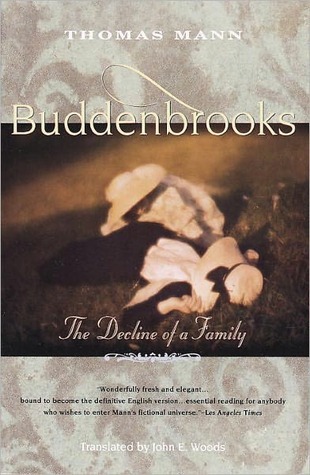More on this book
Community
Kindle Notes & Highlights
“Trade schools and technical schools and commercial schools are popping up like mushrooms, and grammar schools and classical education are suddenly all foolishness, and the whole world has nothing in its head but coal mines and factories and making money. Fine, fine, it’s all very fine. But on the other hand a bit stupide, over the long term—is
HOFFSTEDE had hit the nail on the head in his remarks about Consul Buddenbrook’s two sons. Thomas, who was destined from birth to be a merchant and the future owner of the firm, attended
old citizens were wrangling. “Retain restricted voting rights!” one side said, including Consul Johann Buddenbrook himself. “Universal franchise,” said the others, including Hinrich Hagenström. And then there was yet another group who cried, “Universal restricted franchise,” and some of them perhaps even knew what they meant by it. And the air was full of notions such as the abolition of
with sinful hearts, and if they want to look down on me as a miserable worldly woman, why, I’ll just laugh in their faces. I’ve always been of the opinion that all men are equal, and that we don’t need any middlemen between us and our God. You know my political principles, too. I want each citizen to stand in direct relation to the state.” “So you’re feeling a little lonely, is that it?” Thomas asked to bring her back to the point. “But, now, listen here, you have Erika, don’t you?”
innocence. “The beer’s not exactly Hofbräu, Herr Permaneder, but it’s better than our local brew, at any rate,” the consul said, pouring him some of the foaming brown
Permaneder had made the accurate observation that Erika was a “durn” sweet, pretty child, but that she bore almost no resemblance to her mother. To which Tony responded, “She’s her father all over, and is none the worse for it, one might say.
the goatee on his little round chin bristled. “What a puny, disgustin’ cuss! If I had that mangy dog here right now, I’d knock him into next week.” “Shame, shame, Herr Permaneder!
departed two days later—“ ’cause otherwise Noppe’ll start raisin’ holy hell.” In July, however, Frau Grünlich arrived in his beloved hometown,
convert into cash the amount specified in his father’s will for his sister’s dowry, a total of fifty-one thousand marks courant, which sum was then converted into guldens and was received intact by Herr Permaneder, who then transferred it to secure and profitable
“Courant” used all the time after money amount. From usage to describe a bank account in France that was freely available, that is, not a trust fund or savings account. Another word for it could just be “cash.” Why does Mann use it so often, tho?
and the Ladies Buddenbrook from Breite Strasse, who, by the way, when they learned of these events had stared down into their laps, where their hands lay folded, and froze in ramrod astonishment that this satisfaction, too, had been granted to them; she told Therese Weichbrodt, whose lessons
that day in Hamburg when he had personally delivered ten thousand marks courant to him, an advance on his inheritance to cover debts. “Just keep it up,” the consul had said,
lucky, and this house rose up here out of the earth. But ‘senator’ and ‘house’ are superficialities, and I know something else that you weren’t even thinking about that day, something I’ve learned from life and history. I know that the external, visible, tangible tokens and symbols of happiness and success first appear only after things have in reality gone into decline already. Such external signs need time to reach us, like the light of one of those stars up there, which when it shines most brightly may well have already gone out, for all we know.”
And so the senator sat staring with weary eyes into the darkness of the salon, and a familiar sense of shame and desperate impatience came over him as he pictured the fallen state of the firm of Johann Buddenbrook and all its insignificant, small-scale, pennywise transactions.
up in a quarrel, in one of their deeply regrettable, heated disputes. With his usual compromising indiscretion, Christian had made a careless remark for a great many people to hear—a remark that had shocked him, made him angry, absolutely furious, and for which he had called him to account. Actually, Christian had said, every businessman is basically a swindler. And now? Was that insipid, contemptible remark really
practice and persuasion. “Pfühl,” she said, “be reasonable, just take it in calmly. His unusual use of harmony confuses you. You find Beethoven pure, clear, and natural in comparison. But remember how Beethoven disconcerted his contemporaries, whose ears were trained to the old ways. And Bach himself, good Lord, they accused him of being dissonant and muddy. You speak of
That’s merely flimsy idealism.” He understood her, he understood what she said. But his emotions were unable to follow her—he could not comprehend why melodies that cheered him up or moved him were cheap and worthless, or why music that seemed harsh or chaotic should be of the highest musical value. He stood before a temple, and Gerda stood at the threshold adamantly barring his way. And then he watched in pain as she disappeared inside with his child.
Hugo Weinschenk’s problem? This earnest, industrious, but chipper man with a rough exterior and no social graces whatever, this man who devoted himself to his work with a dogged sense of duty—this man was alleged
raging rabble. What a horror of horrors it had been. No, his life had not been poor, not even his interior life. Damn, but he had felt the surge of his own energy, and “as the energy, so the ideal,” to quote Feuerbach. Even now, even now—his soul was not impoverished, his heart was still young, it had never ceased, would never cease to encompass


